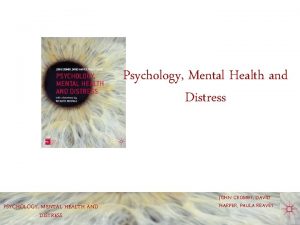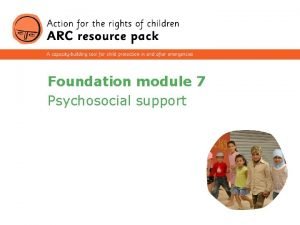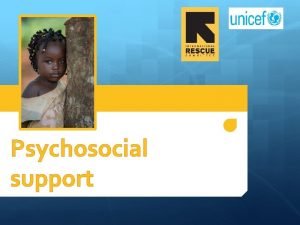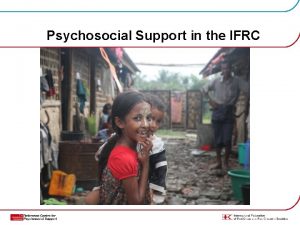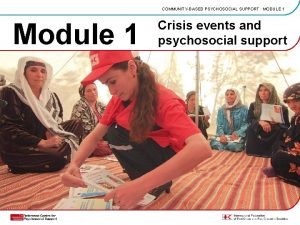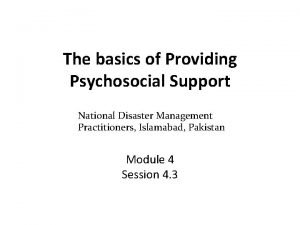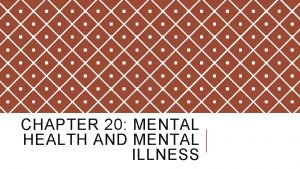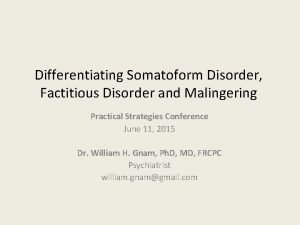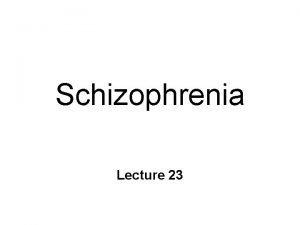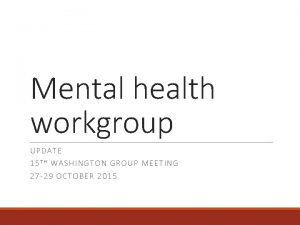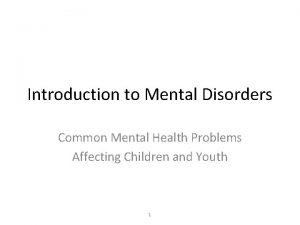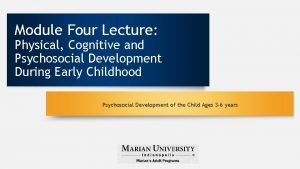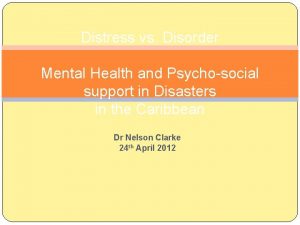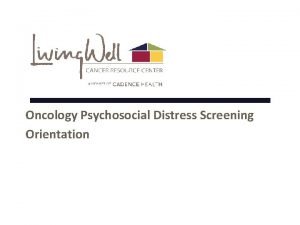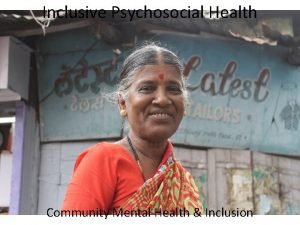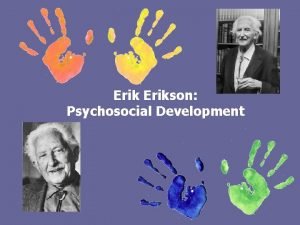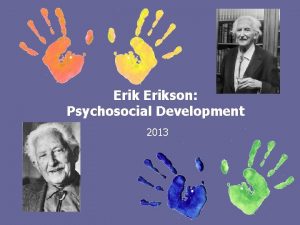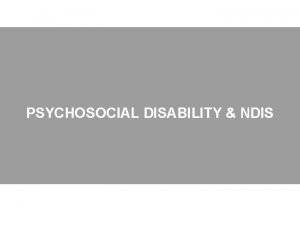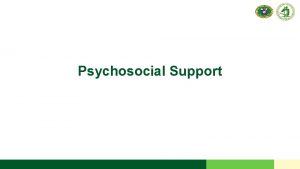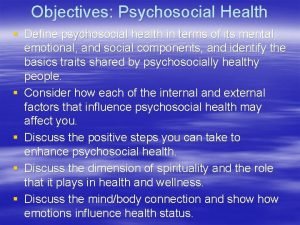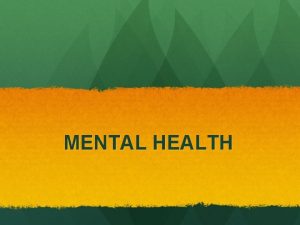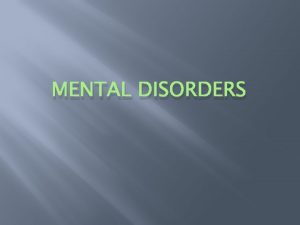Distress vs Disorder Mental Health and Psychosocial support















- Slides: 15

Distress vs. Disorder Mental Health and Psycho-social support in Disasters in the Caribbean Dr Nelson Clarke 24 th April 2012

The Caribbean � A conglomerate of island states � Share many similarities, similar histories, development problems, reliant on tourism � Many differences between and within states, ethnicity, language, religion, culture � Colourful, musical, laidback, fun-loving, (Carnival, Junkanoo, Fete) � Deficiencies in infra-structure � Significant poverty, pockets of wealth within countries � Widespread belief in the occult, mystical beliefs � Mystical beliefs about mental illness is widely prevalent � Many myths exist regarding the causes, treatment and possibility of recovery

Only 10% of people experience significant symptoms �Although disasters have been associated with the development of psychological symptoms, few people end up with mental illness as a direct consequence �Psychological Reactions to the disaster, on the other hand are common and should be expected.

Anxiety is common �Most people experience anxiety during and after a disaster �It usually resolves over time �No specific treatment is required �In some individuals somatic complaints may be predominant

Common reactions of adults during the impact and immediate post disaster period • • • Feeling dazed or numb Feeling shocked Shaking and trembling Feeling anxious and fearful Feeling vulnerable and unsafe Feeling easily upset Being emotional, crying, Irritability Anger Feeling detached/its unreal/ it’s a dream Recklessness and unnecessary risk taking

The Acute Reactions to Stress � These are very common � Usually recede over a few weeks � After a month there is appreciable improvement � They may serve an adaptive function � They do not need “treatment” � Support by family, friends, others in the community is sufficient to help � Not good to medicalize these reactions

Most severe Psychological Reactions eventually improve over time � Disasters may result in widespread psychological distress � Severity of reactions may relate to perceived losses or possibility of further risk � Avoid premature labeling of persons � Support within the community is very important in assisting people in handling their reactions to a disaster � People still experiencing severe reactions after a month with no appreciable improvement need to be carefully evaluated

Stigma against those with mental health problems is still an issue �People experiencing significant mental health problems may experience ridicule, persecution, exclusion �It might be difficult for them to accept that they need help, given the risk of ridicule and stigma �Stigma against the mentally ill is widespread

Clues to Identifying severe mental disorders �Inability to self care �Inability to look after one’s children or dependents �Presence of delusions �Hallucinations �Threats to harm self �Attempts to harm self �Compulsive use of mind altering drugs �Expressions of violent intent, threats made to others �Actual violent behaviour

Individuals of all ages are likely to experience psychological reactions to a disaster or traumatic event �The emphasis most often is on the adult population �Some groups are forgotten, the elderly, the young, those with physical and sensory impairments, �People with pre-disaster mental illness are often forgotten in the confusion that occurs after a disaster

Mental Disorders should be diagnosed using specific diagnostic criteria �Depressive Illness �Bipolar Illness �Anxiety Disorders (Phobias, Panic Disorder, Generalized Anxiety Disorder, OCD, PTSD) �Post Traumatic Stress Disorder �Substance Dependence Disorders ( Alcohol, Cannabis, Benzodiazepines e. g. Ativan, Valium) �Psychotic Illness (Psychosis)

When Disorder is suspected �Evaluation should be carried out in the primary care setting �Strongly recommended that specific criteria are used to diagnose disorders/illnesses �WHO-mh. GAP strategies are helpful and can be utilized by primary care health personnel in managing persons diagnosed with mental health disorders

Mental Distress or Mental Disorders? The 2 D’s Distress Disorders Common � A response to environmental challenges � May be adaptive – drives personal and community responses � Usually short term and– does not significantly impair functioning for long � Should not be “diagnosed” � Usually does not require professional intervention – no therapy, no medications � Usually responds well to “usual” personal and community supports and positive lifestyle activities � Encouragement to rapidly return to “usual” activities Less common � Frequently onsets without environmental challenges � Frequently long term (may be chronic and episodic) – significant functional impairment � Must meet recognized diagnostic criteria (ICD; DSM) � Frequently requires professional intervention – many different types � Usually responds well to evidence based treatments � Usually helped by appropriate supports and positive lifestyle activities

Summary �Disasters often result in widespread reactions of anxiety, depressed mood and hightened vigilence �Most people recover without developing a mental illness. Most people are helped by friends/ family support �Psychological First Aid should be available for everyone �Care should be taken not to overdiagnose/estimate mental illness developing after a disaster �After a month most persons are very aware of their progress

Summary �Forgotten people, the homeless, elderly, children, immigrant populations, persons who have preexisting mental illness (those in the community and in mental hospital) are often overlooked �When mental illness is suspected specific criteria need to be utilized in diagnosing the disorder �Treatment in the primary care setting is best, and health care personnel may use the strategies in mh. GAP to assist in managing identified disorders.
 Psychology, mental health and distress
Psychology, mental health and distress 7 psychosocial support
7 psychosocial support Types of psychosocial support
Types of psychosocial support Psychosocial approach definition
Psychosocial approach definition Psychosocial module 1
Psychosocial module 1 Types of psychosocial support
Types of psychosocial support Mental health and mental illness chapter 20
Mental health and mental illness chapter 20 Stress management jeopardy
Stress management jeopardy Factitious disorder
Factitious disorder Axis 1 and axis 2 disorders
Axis 1 and axis 2 disorders Mental disorder definition
Mental disorder definition Mental disorder definition
Mental disorder definition Causes of mental disorder
Causes of mental disorder Psychosocial and aesthetic factors
Psychosocial and aesthetic factors Define physical cognitive and psychosocial development
Define physical cognitive and psychosocial development Minor and major details
Minor and major details
